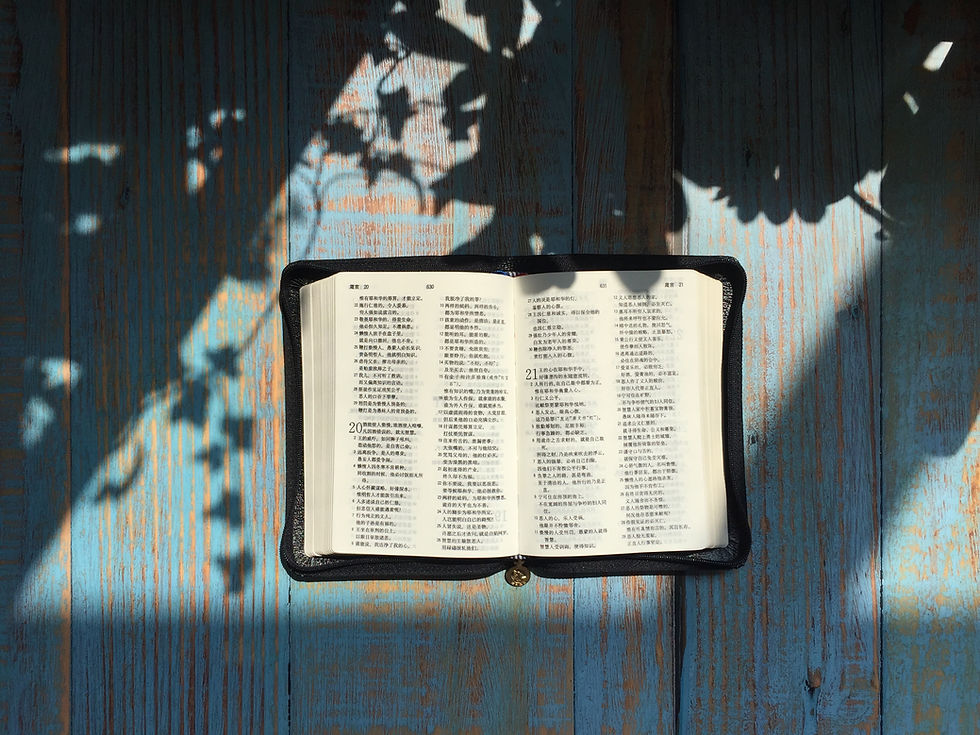Malachi Closes the Old Testament Revelation
- Amber Davis
- Aug 17, 2024
- 3 min read
“A son honors his father, And a servant his master. If then I am the
Father, Where is My honor? And if I am a Master, Where is My
reverence? Says the LORD of hosts To you priests who despise My
name...” (1:6 NKJV*).
“Yet you say, ‘For what reason?’ Because the LORD has been
witness Between you and the wife of your youth, With whom you
have dealt treacherously...” For the LORD God of Israel says That
He hates divorce...” (2:14-16).
“Behold, I send My messenger, And he will prepare the way
before Me. And the Lord, whom you seek, Will suddenly come
to His temple, Even the Messenger of the covenant, In whom you
delight. Behold, He is coming,” Says the LORD of hosts. “But who
can endure the day of His coming? And who can stand when He
appears? For He is like a refiner’s fire And like launderers’ soap. He
will sit as a refiner and a purifier of silver; He will purify the sons of
Levi, And purge them as gold and silver, That they may offer to the
LORD An offering in righteousness” (3:1-3).
“For I am the LORD, I do not change...” (3:6).
“For behold, the day is coming, Burning like an oven, And all the
proud, yes, all who do wickedly will be stubble...” (4:1).
“But to you who fear My name The Sun of Righteousness shall arise
With healing in His wings; And you shall go out And grow fat like
stall-fed calves” (4:2).
“Behold, I will send you Elijah the prophet
Before the coming of the great and dreadful
day of the LORD. And he will turn The hearts
of the fathers to the children, And the hearts
of the children to their fathers, Lest I come and
strike the earth with a curse” (4:5-6).
*All Scripture verses are taken from the NKJV.
This is the last book in our minor prophet survey, Malachi. I hope this series has been interesting and encouraging to you. Malachi likely prophesied around the time of Nehemiah, somewhere around 440 B.C. The remnant has returned and been home for roughly 100 years; the temple is rebuilt, and Jerusalem itself, with its walls, is being completed. Yet, for all this, the people remain spiritually dull. Idolatry does not take hold again, but in its place is an indifference, filled with outward rituals but no inward substance.
Through Malachi, God rebukes the priests and the people for their unfaithfulness; then, He targets a particular sin: putting away their Jewish wives and marrying daughters of
foreign gods. He uses a question-and-answer method unique to Malachi. Throughout it,
the people complain. He then propheciesabout Jesus and John the Baptist, and the Old Testament revelation closes. No more word from the Lord will come until John begins his work.
One plain message is that God takes note of how we worship Him and does not accept
anything we want to offer or do. The people were still bringing sacrifices, but it was the
lame and the blind and runts of the herd. We have been instructed by the Lord of Lords to
“worship in spirit and in truth” (John 4:24). We must take note. Our God seeks faithfulness
from His people. Indifference, apathy, and ceremonialism bring His condemnation.
But the prophet still brings a great message of hope. A Messenger will come (John the
Baptist), and then the Lord will come. The Sun of Righteousness (Jesus) will arise with healing in His wings. We live on this side of that first advent; we bask in His light and rejoice in the blessings secured at Calvary. And we wait for the second advent when He shall come
again. Let us learn from Israel’s good and bad examples as we serve Him with anticipation
of that day.
—John Ostic








Comments